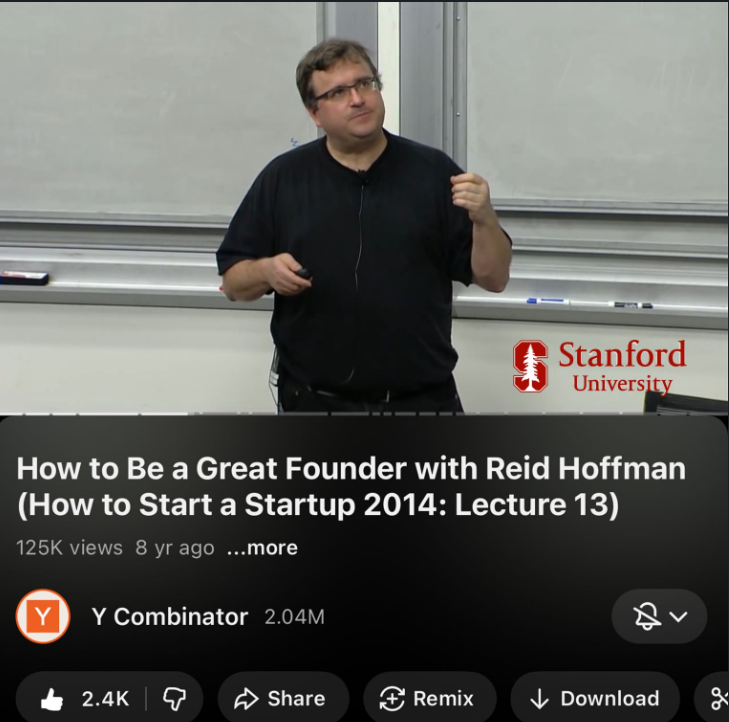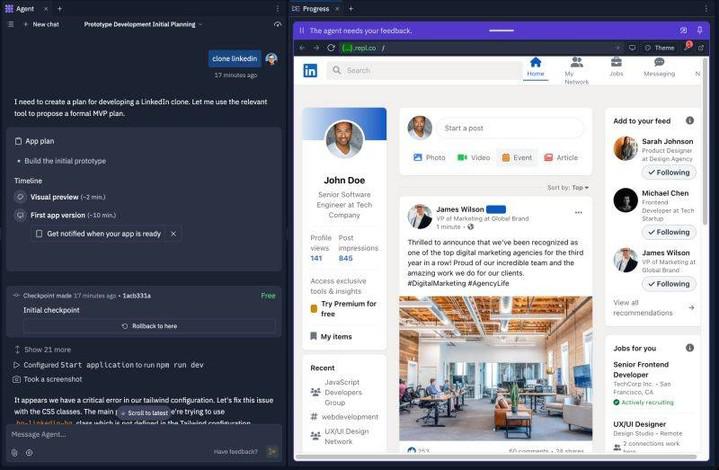Back
Vijay
Let's Snoozeit ⚡ • 17h
Why every startup founder should watch this? Back in 2014, Reid Hoffman (LinkedIn founder) gave a lecture at Stanford that’s still one of the most practical breakdowns of what it really takes to be a great founder. He says most founders get it wrong. It’s not about being a genius - it’s about how you think, what you believe, and how you adapt. Here are 5 powerful lessons for early-stage founders: 1️⃣ You don’t need to be a superhuman founder. You don’t need to be good at everything. And you won’t be. What does matter: → Having 1-2 real superpowers (e.g. product sense, storytelling, sales) → Being self-aware enough to hire or partner where you’re weak → Choosing co-founders who complement you, not mirror you Great founders don’t do it all. They build teams that do. 2️⃣ A contrarian idea only matters if you're right. “Contrarian” doesn’t mean weird. It means seeing value before others do. Ask yourself: → “What would smart people disagree with here?” → “What do I know that most don’t - and how will that become obvious later?” Reid had this when he launched LinkedIn - everyone said it wouldn’t work without millions of users. He knew how to get to millions. 3️⃣ Great founders live in paradoxes. There’s no clean playbook. The job is learning when to switch gears. You’ll need to: → Hold your vision, but also let it evolve → Build fast, but avoid building the wrong thing fast → Stay confident, but question everything Mastering these tensions isn’t a bug, it’s the job. 4️⃣ Your “investment thesis” is your compass. It’s your core bet. The belief that ties everything together. Ask: → Why does this company need to exist? → What specific assumptions have to be true for this to work? → How will I test and validate those assumptions? This becomes your decision filter - from product to fundraising to hiring. 5️⃣ Know when to stick vs. when to pivot. Too many founders pivot from panic or boredom. Reid’s approach: track confidence in your thesis. → If it’s increasing → push harder → If it’s dropping → investigate and adjust It’s not about being stubborn. It’s about being honest with what the market is telling you.

More like this
Recommendations from Medial
EDITKARO
"Craft your story, f... • 1d
Why do so many smart founders avoid being on camera? I’ve learned it’s rarely about confidence. It’s about control. Video forces you to show the parts you can’t polish, rehearse, or hide behind a deck. But here’s the twist: those unpolished parts a
See MoreVishal D Pawar
Delivering Promises! • 2m
Why do most #investors hesitate to #invest in startups from Bihar? Because many founders here focus more on being “helpful” rather than being “practical.”🫡 And when you lose practicality, you lose scale.💯 Recently, I was talking to a founder who
See More
Hitanshu Jha
Sugar Free Flavorful... • 4m
Being a student is hard. Starting a company while being one? Even harder. But here’s the truth: you don’t need to have it all figured out to start. You just need to start. As a student founder, I’ve faced: Time crunch Academic pressure Lack of re
See MoreKishan Kumar Yadav
Live the life you wa... • 1m
Day 3 — The Hard Truth About Building Trust Day 3 feels different — not because something big happened, but because nothing did. I’ve reached out to 100+ founders and faced more “no’s” and silences than I expected. It’s exhausting — but revealing.
See MoreDownload the medial app to read full posts, comements and news.





































